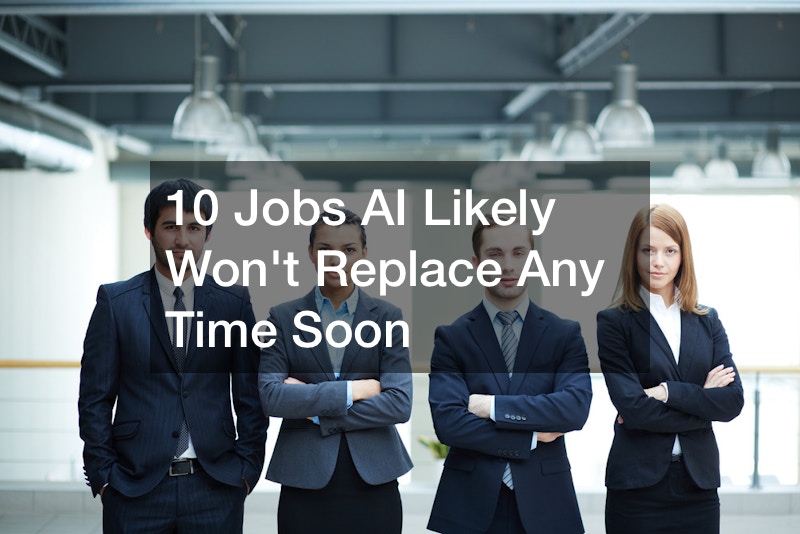
10 Jobs AI Likely Won’t Replace Any Time Soon
Artificial intelligence has created a lot of buzz lately with the fantastic things it can do. For example, it makes content, offers personalized shopping, processes loans, and detects fraud. But unfortunately, AI has also raised concerns about the future of jobs. For example, according to a report by Goldman Sachs, the rise of artificial intelligence could jeopardize 300 million jobs.
But, while AI may replace some professionals in the future, there are some jobs it will have a hard time taking over. These include jobs that require a high level of human interaction and critical decision-making skills. Therefore, if you are worried about your job, below is a look at some top professionals that AI likely won’t replace soon.
Legal Professionals
One of the top jobs people are worried about AI replacing is that of legal professionals. After all, artificial intelligence systems can learn law through machine learning. Fortunately, these jobs are safe, as several challenges make it difficult for AI to practice law.
One of the top reasons AI likely won’t replace lawyers is that it can’t replace human judgment and creativity. Additionally, AI systems cannot listen, empathize, understand human emotions, or make complex reasoning. All of these are human elements of the law needed to ensure fairness.
Another challenge with AI is that it might struggle in situations where the law is vague. For example, some of the languages used in law practice, like ‘reasonable doubt’ and ‘good moral character,’ can be too vague for an AI system that takes everything at face value.
But while AI cannot replace lawyers, it might help simplify and make their work more efficient. For example, according to a McKinsey report, up to 23% of lawyers’ tasks can be automated – and possibly handed over to AIs. These tasks include document review, text mining, proofreading, legal research, and drafting of documents.
Mental Health Specialists
Mental health experts are other professionals who might be worried that AI will replace them. After all, according to Google, their AI system, LaMDA, is capable of having open-ended conversations. It can also access large amounts of data, identify patterns, correlate things, and make predictions. These abilities can make an AI effective in offering mental health advice.
However, a therapist is another professional that AI likely won’t replace soon, despite the amazing things it can do. The top reason for this is that AI cannot replace the interpersonal connection between patients and therapists. Additionally, unlike psychiatrists, AI systems lack the human experience and emotional understanding to make ‘human-based’ judgments.
Lastly, AI systems are not conscious and thus cannot empathize – they can only stimulate empathy in their response. This can make any advice AI offers ineffective, as patients require a connection with their therapists. After all, according to the American Counselling Association, acceptance and validation are vital to treatments.

Medical Professionals
Medicine is another sector where there’s a lot of fear about AI taking over people’s jobs. According to the Association of American Medical Colleges, AI outperforms human doctors in areas such as screening and diagnosis. However, despite these fantastic feats, doctors are other professionals AI likely won’t replace soon.
One of the main challenges of AI in healthcare is that it lacks human experience, creativity, and empathy to make critical decisions when treating patients. Additionally, AI cannot replace doctors who offer hands-on services, such as cosmetic surgeons. The best it can do is improve the accuracy of surgeons – but you’ll still need a human doctor directing or overseeing these procedures.
Lastly, AI faces several limitations that would make it challenging to function as an independent physician. For example, according to Verge, Google’s chatbot AI made a factual error during its launch. In the medical field, such an error can result in devastating consequences or, worse, the death of a patient. In addition, AI has also raised safety, security, and privacy concerns, as AI systems can be tricked or hacked.
Artists of All Kinds
Artists all over the world are afraid of AI taking over their jobs. After all, the internet is full of several AI apps that create art from scratch with just a few prompts. On top of that, AI systems like ChatGPT have raised concerns about the future of creative professionals such as designers, writers, music composers, photographers, voice actors, etc.
However, despite the threat to the creative industry, artists are other top jobs AI likely won’t replace soon. The principal reason for this is that art is human – based on creative expressions, emotions, experiences, thoughts, and ideas. All of these are characteristics that AI cannot replace.
Another area where AI cannot compete with humans is where hands-on artistry is required. For example, AI systems cannot replace the craft and experience of a tattoo artist. And even if AI could create tattoos, it can’t replace a human artist’s personality, emotion, unique style, and experience.

Veterinary Specialists
Like several other professionals, many veterinary specialists are worried about AI and robots taking over their jobs. After all, if you train an AI system to do something, it can learn and potentially do it better and more accurately than a human being. However, you can rest easy if you are considering a vet career or already have one – your job is one of the top ones that AI likely won’t replace.
One of the main challenges of using AI in veterinary medicine is that it lacks the manual and finger dexterity needed to perform hands-on veterinary procedures. On top of that, unlike veterinarians, AI systems lack the creativeness and experience required to make critical, independent decisions on the care of animals. AI vets can also face challenges in accurately diagnosing animals in some cases, as animal behavior is not universal.
Another top reason why AI won’t be replacing human vets any time soon is because they lack interpersonal skills. According to the American Veterinary Medical Association, veterinary specialists need good interpersonal skills to offer quality care to animals and their owners. So, an AI robot is unlikely to be effective at providing the best care, let alone popular amongst animal and pet owners.
Construction Workers
The construction industry is another sector with widespread fear of AI taking over people’s jobs. According to an article by Futurism, Japan has been replacing elderly construction workers with smart robots. And with robots able to handle heavier workloads and work tirelessly for periods, the concern for AI taking over jobs is genuine.
However, even with these worrying trends, construction workers are other professionals that AI likely won’t replace any time soon. The top reason for this is that construction work is inherently complex. Therefore, workers must possess high intellect, creativity, and complex reasoning, which AIs don’t have.
The chaotic nature of construction work is another reason AI won’t replace construction workers anytime soon. On top of that, construction sites differ from one to the other, and the conditions can quickly change due to external factors such as weather. As a result, robots cannot independently navigate these sites as safely and fast as human beings can while performing meaningful tasks.
But not everything about AI is terrible, as construction companies can benefit from intelligent robotic systems. For example, AI can improve safety in construction sites by monitoring and identifying potential hazards. AI systems can also make it easy to do daunting construction tasks such as lifting heavy materials, thus making construction safer and faster. However, these AI systems will still need humans to operate or monitor them. Therefore, plumbing contractors need high intellect and diverse technical expertise.

Plumbing Contractors
According to Time Magazine, contractors such as those in the plumbing and electrical sectors will not be easily replaced by AIs. Some experts on AI have even claimed that plumbers will be the last to lose their jobs if artificial intelligence systems become advanced enough to take over. If you’re a plumber or are considering a career in this sector, your job is one of the top ones that AI likely won’t replace soon.
One of the top reasons why AI won’t be taking over from plumbers soon is the complex nature of the work involved. Plumbing jobs involve various tasks, from fixing leaks to installing plumbing systems, installing and repairing appliances, unclogging plumbing systems, etc. Therefore, contractors need high intellect, diverse skills, experience & expertise, and the ability to think independently. All these are unique human characteristics that robots can’t easily replace.
Plumbing work’s chaotic nature is another reason AI won’t replace human contractors. Furthermore, each plumbing job differs in several ways; thus, AI systems would have difficulty navigating the job site and carrying out the required tasks. Lastly, AIs (even advanced robots) lack the human agility and flexibility to carry out various plumbing tasks.
Roofing Contractors
According to a report by TechCrunch, a robotics company is currently developing a robot to install roofs. Naturally, the roofing industry is another area where people are worried about the safety of jobs, given the rise of AIs. However, it’s unlikely that AI and robots will replace roofers.
While you can use an AI to install roofing shingles, roof contractors handle many more tasks than roofing installation. For example, they fix roof leaks, install & maintain gutters, install insulation, waterproof roofs, measure and cut roofing materials, and more.
Therefore, you need a very advanced AI to handle all required roofing tasks independently. Alternatively, you would have to train several AI systems each for a specific roofing job. Both of these scenarios are unlikely to happen any time soon, making roofers’ jobs safe from AI.
Another problem with AI roofers is that each roofing site is unique. It’s also often chaotic, with the conditions being made worse by weather elements such as snow or rain. On top of that, roofers often have to move around in cramped spaces and stay in awkward positions. Therefore, AI and robots will have difficulty performing roofing tasks as they lack the flexibility, agility, and common sense to move around easily.

Dental Specialists
According to a report by Business Insider, a robotic dentist successfully performed a dental implant procedure on a patient in China. Of course, such an achievement can concern anyone afraid of losing their job to AI. However, even with such advanced milestones, dental specialists are other professionals AI likely won’t replace anytime soon.
One of the top reasons AI won’t replace dentists anytime is because of the complex nature of their work. A dental specialist performs many tasks, from screening and diagnosis to tooth removal, filling, & implantation, crown & veneers, braces, tooth cleaning, and more. Therefore, dentists need diverse skills and expertise, which AIs can’t achieve.
Another reason why AI and robots are unlikely to replace dentists is the lack of human touch. On top of fixing a patient’s teeth and smile, a dentist needs to have a personal connection with their patient, especially young kids, and people who are often scared of dental visits.
But while AI won’t replace dentists, it can make their work easier. According to Dentistry Today, artificial intelligence is helping to complement dentists, leading to better care for their patients. For example, in the case of the Chinese robot dentist, human dentists were present during the procedure to monitor the situation and step in in case of a problem. Therefore, AI didn’t take over their work – they used it as a tool to offer faster and more accurate dental treatment.
Teachers and Professors
According to the British Council, some education experts predict robots will replace human teachers by 2027. This concern is shared by many in the teaching profession – after all, AI and robots have access to large datasets and thus can transfer this information to learners. However, there are many challenges in using AI in classrooms, and you’re unlikely to see a robot teacher anytime soon.
One of the barriers to having AI as teachers in schools is that learning is more than just the transfer of information. In the classrooms, teachers and professors must interact with the students, nurture their curiosity, listen & respond to their problems, create conducive learning experiences, etc.
On top of personal interactions, individuals learn at different paces. Therefore, teachers need to deliver personalized attention to all their students. And since artificial intelligence systems and robots can’t replace this human element in learning, teaching is another top job AI likely won’t replace any time soon.
But while AI won’t replace teachers, it’s likely to be used increasingly in classrooms in the coming years. According to Towards Data Science, AI is used in several ways in the education industry to improve learning. This includes grading, remote learning, creating personalized study paths based on learners’ habits, and more.
As AI becomes more advanced, the world will see more automation. Consequently, millions of people may lose their jobs to AI systems and robots. However, the above are some of the top jobs that AI likely won’t replace soon due to the complexities involved and the need for a human touch for these careers.

